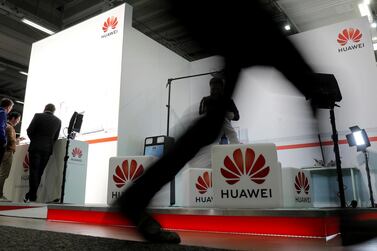Increased investment in the fifth-generation (5G) wireless network will be a “priority” for global telecoms operators in 2020 but take-up of the technology will remain “slow and patchy”, analysts say.
However, 5G deployment promises good returns to investors as analysts expect broader adoption across industries such as autonomous vehicles, artificial intelligence, the Internet of Things and healthcare.
Total revenue from the deployment of 5G infrastructure will reach $4.2 billion (Dh15.43bn) globally in 2020, almost a 90 per cent rise from this year’s estimated figure of $2.2bn, according to US researcher Gartner.
"5G roll-out is dependent on the timely release of spectrum and no small amount of hard cash," Matthew Kendall, chief telecoms analyst at The Economist Intelligence Unit, told The National.
Given the existing “low margins and cost pressures” experienced by many operators - some of whom continue to focus on boosting 4G speeds, availability and geographic coverage - take-up of 5G is likely to be slow next year, Mr Kendall explained.
A 5G network promises an internet speed of up to 1.2 gigabits per second, which will gradually reach 10Gbps — more than 100 times faster than 4G. A 5G network has a latency of less than one millisecond, compared to 20 milliseconds for a 4G network.
Etisalat, the UAE’s biggest telecoms operator, in May became the first service provider in the region to offer a 5G network, supporting smartphones for commercial use. It was soon followed by the country's second telecoms operator Emirates Integrated Telecommunications Company, or du as it is commonly know, and Bahrain's Batelco.
Finnish manufacturer Nokia, Sweden's Ericsson and China's Huawei are the main competitors in the region's 5G race, vying for contracts for their equipment and technology.
"Even though 5G developments are in the early stages, du is aggressively deploying the network and increasing its footprint," Saleem Al Blooshi, chief technology officer at du, told The National.
Du aims to increase its technology spend by as much as 25 per cent to Dh1.5bn in 2019, as it looks to build more than 700 5G towers in the UAE, the second-biggest Arab economy, boasting more than 100 per cent mobile phone penetration.
Currently, 5G is using a "non-standalone mode" that is capable of providing ultra-fast broadband speeds of up to 1.2Gbps only. Du plans to deliver the next levels of speed in 2020.
“We are planning to have the next phase of the 5G technology, standalone mode, by next year. This will ensure very high speed, low latency in communications and allow Machine-Type Communication [MTC],” said Mr Blooshi.
In MTC networks, several internet connected devices can communicate with each other with very little or no human intervention.
While 5G outpaces and outsmarts existing networks by far, the biggest hurdles in 5G adoption will be its affordability – services are too costly or devices are too expensive, said the International Telecommunication Union, a UN-backed internet and telecoms agency.
Infrastructure for the 5G is more expensive than that of 4G and its predecessors, as it requires more towers and radio stations for effective services. A higher demand on bandwidth as 5G waves travel shorter distances means more mini-towers are needed.
In an analysis of one European country, consulting firm McKinsey predicted that network-related capital expenditure would have to increase 60 per cent from 2020 through to 2025, roughly doubling the total cost of ownership.
The ITU, nevertheless, is confident that technology costs will come down with greater private sector involvement in the industry.
“In the Middle East and North Africa (Mena), commercial 5G deployments with leading service providers have taken place in 2019… and more deployments are expected in 2020 and beyond,” said Chafic Traboulsi, head of networks for Middle East and Africa at Ericsson.
“By the end of 2025, we expect 90 million 5G subscriptions in Mena, representing around 10 per cent of total mobile subscriptions.”
Globally, there will be 2.6 billion 5G subscriptions covering up to 65 per cent of the world’s population and generating 45 per cent of the world’s total mobile data traffic in the next six years, according to Ericsson’s forecasts.
However, one analyst said the 5G consumer-use case is still not clear.
“High costs .... and a lack of 5G-ready smartphone devices are a few impediments to growth in the consumer segment,” said Mr Kendall
Most 5G-enabled handsets are currently priced at the top end of the market costing Dh5,000 or more.








